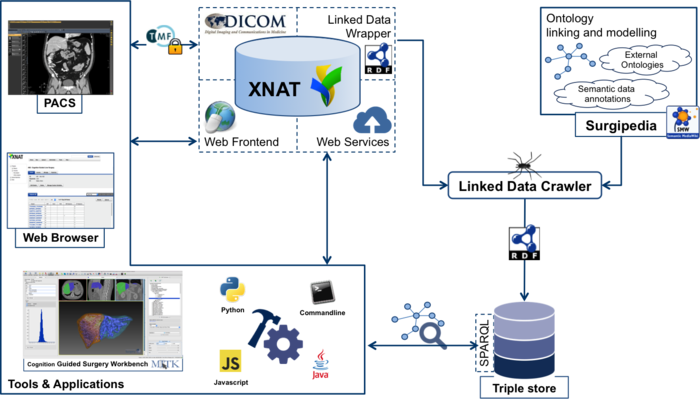Difference between revisions of "CGS"
| Line 23: | Line 23: | ||
The Extensible Neuroimaging Archive Toolkit (XNAT) is a flexible data storage system. It is developed at the Washington University in St. Louis and focuses on storing medical image data but is capable to handle arbitrary data as well. | The Extensible Neuroimaging Archive Toolkit (XNAT) is a flexible data storage system. It is developed at the Washington University in St. Louis and focuses on storing medical image data but is capable to handle arbitrary data as well. | ||
| − | * Install XNAT:<br /> A detailed description about how to install XNAT can be found here: https://wiki.xnat.org/display/XNAT16/XNAT+1.6+Installation+Guide | + | * '''Install XNAT:'''<br /> A detailed description about how to install XNAT can be found here: https://wiki.xnat.org/display/XNAT16/XNAT+1.6+Installation+Guide |
| − | * XNAT Linked Data Wrapper: | + | * '''XNAT Linked Data Wrapper:''' |
** Utilizes the comprehensice REST API of XNAT and converts its responses into linked data | ** Utilizes the comprehensice REST API of XNAT and converts its responses into linked data | ||
** Thus connects XNAT to the semantic data infrastructure. | ** Thus connects XNAT to the semantic data infrastructure. | ||
Revision as of 13:26, 9 February 2016
Overview
On this page you can find detailed information about how to build up the semantic data infrastructure that is published in:
Fetzer, A., J. Metzger, D. Katic, K. März, M. Wagner et al., "Towards an open-source semantic data infrastructure for integrating clinical and scientific data in cognition-guided surgery.", in Proc. SPIE Medical Imaging 2016 "PACS and Imaging Informatics: Next Generation and Innovations", 9789-22, (2016)
The proposed infrastructure allows you to integrate heterogneous data sets and make them available via a unified interfaced. Also the data can be annotated and integrated semantically which facilitates complex semantic queries on the data.
An overview about the components of the infrastructure is depicted in the figure below:
Following we briefly describe the components and tools of the infrastructure and how to get/install them.
Semantic data infrastructure
XNAT - A flexible data storage
The Extensible Neuroimaging Archive Toolkit (XNAT) is a flexible data storage system. It is developed at the Washington University in St. Louis and focuses on storing medical image data but is capable to handle arbitrary data as well.
- Install XNAT:
A detailed description about how to install XNAT can be found here: https://wiki.xnat.org/display/XNAT16/XNAT+1.6+Installation+Guide
- XNAT Linked Data Wrapper:
- Utilizes the comprehensice REST API of XNAT and converts its responses into linked data
- Thus connects XNAT to the semantic data infrastructure.
- Is available here: http://surgipedia.sfb125.de/wiki/XNAT_Wrapper
- Contact Marco Nolden for detailed information
Surgipedia - A semantic media wiki
Semantic Media Wiki is an extension to the Media Wiki that can be used as an flexible knowledge management system.
- How to install semantic media wiki:
A detailed description about how to install a semantic media wiki can be found here: https://www.semantic-mediawiki.org/wiki/Help:Installation
- Have a look at Surgipedia, our semantic media wiki instance: https://surgipedia.sfb125.de
Linked data crawler
Both the contents of the semantic media wiki and XNAT are aggregated by a linked data web crawler into a central triple store.
- Linked data crawler:
Detailed information about LDSpider, the linked data crawler we are using, can be found here: https://github.com/ldspider/ldspider
Triple Store
A triple store is a data base which is especially designed for handling linked data from the semantic web. There are many triple store implementations available and the choice which you want to use is up to you. Here is a small selection of available triple stores:
- The one we are using: OpenLink Virtuoso
- Redland
- Apache Jena
Cognition-Guided Surgery Workbench
The CGS Workbench is an MITK-based desktop application, which provides both flexibility and extensibility for methods integration and unified interfaces to the proposed infrastructure.
Core-features of the CGS Workbench are:
- DICOM viewing
- Image processing: Segmentation, measurement, image statistics
- XNAT connection: Browse, up- and download your data from XNAT
- Triple store connection: Query / Insertion of triples
- Semantic data annotation: Create annotation files, upload annotation to XNAT or insert directly into the triple store
How to get it?
- Source code as well as binary installers can be found here: https://projects.sfb125.de (registration required)
- Or contact Marco Nolden / Jasmin Metzger
